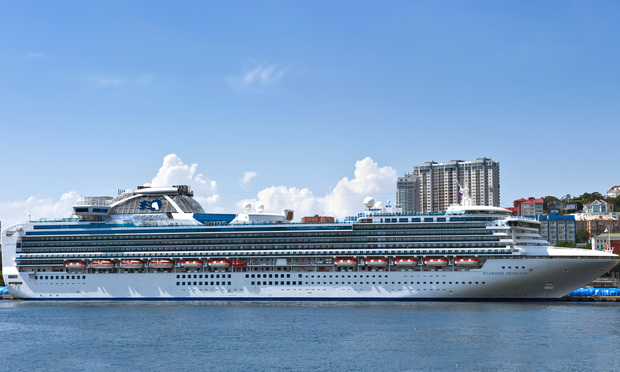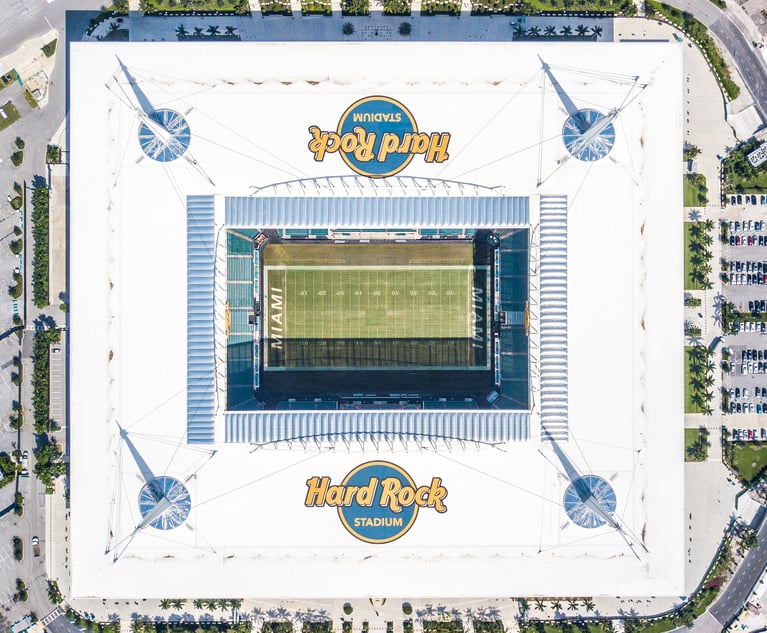Orrick, Quinn Emanuel Face Off Over Carnival's Wearable Tech
The firms represent Carnival Corp. and one of its contractors, with each accusing the other of ripping off their innovations for a medallion-based guest engagement system aboard cruise ships.
April 13, 2020 at 07:16 PM
4 minute read
 Carnival's Cruiseship Diamond Princess.
Carnival's Cruiseship Diamond Princess.
Cruise lines might be hurting for business at the moment, but that's not the case for their IP lawyers.
Carnival Corp. has enlisted Orrick, Herrington & Sutcliffe to sue a contractor whom it accuses of selling its guest engagement technology to rivals such as Norwegian Cruise Line and Virgin Voyages.
Contractor DeCurtis LLC has enlisted Quinn Emanuel Urquhart & Sullivan and Freeborn & Peters to level its own accusations that Carnival fraudulently obtained patents on the technology and unfairly tried to monopolize the market on it.
Carnival sued in the Southern District of Florida on Friday. DeCurtis sued for declaratory judgment in the Middle District two days earlier.
At issue are Carnival's Ocean Medallions, a bluetooth-enabled device the size of a quarter that can be worn in a belt or necklace or carried in a pocket. Through a network of sensors connected by 72 miles of cable, plus 4,000 digital portals supported by cloud-based data centers, a guest with an Ocean Medallion can place a food or drink order from anywhere on the ship and the Medallion will direct crew members to their location. It also provides step-by-step directions to a restaurant, lounge or another passenger, and provides touchless access to the guest's state room, among other services.
"The Ocean Platform is the result of Carnival's years of hard work and substantial investment, including efforts by hundreds of Carnival employees and scores of third-party contractors," Carnival states in its complaint. Carnival invested "hundreds of millions" on what was known internally as Project Trident, housing it in a dedicated 12,000-square-foot facility to maintain secrecy.
One of its contractors, DeCurtis, helped build out the system under a nondisclosure agreement. DeCurtis was privy to "documents describing Carnival's vision, strategy, plans (e.g., strategy presentations), experience platform models, technical design documents, and list of strategic vendors."
Carnival's CEO introduced the Ocean Platform at the 2017 CES. So far, the company has outfitted six Medallion Class ships. By the following year Norwegian had hired DeCurtis, and within months was live-testing its own wearable-based guest engagement program, Carnival alleges.
Carnival says its contract with DeCurtis provides for it to audit its work records to ensure compliance, but that DeCurtis has refused. Carnival alleges that DeCurtis has breached their contract, violated state and federal trade secret laws, and infringed three patents on its award-winning system.
DeCurtis has already sued for a declaration that it doesn't infringe Carnival's patents, that the patents are unenforceable, and that Carnival is engaging in unfair competition.
DeCurtis worked with Carnival's chief experience and innovation officer, John Padgett, at Disney to build out a similar "Magic Band" for Disney cruise ships. Padgett believed that wrist bands weren't ideal for the sometimes formal attire on cruise ships. So DeCurtis came up with the medallion idea and many of the other innovations supporting the platform. But Carnival fraudulently omitted DeCurtis' David DeCurtis from the list of named inventors on the patents, rendering them enforceable, DeCurtis says.
"Carnival has monopolized and restrained trade in the market for guest engagement systems that provide seamless engagement with cruise ship facilities through the use of wireless sensing technologies," DeCurtis' complaint alleges. It's done so by fraudulently obtaining patents from the PTO and "threatening objectively baseless litigation."
DeCurtis' team includes Quinn Emanuel Los Angeles partners Scott Watson, Justin Griffin and Patrick Schmidt, plus Freeborn & Peters Chicago partners David Gustman, Jeffery Cross, Jill Anderson and Jennifer Fitzgerald, and Jason Stearns of Freeborn's Tampa, Florida, office.
Carnival is represented by Orrick Washington, D.C., partners Diana Szego Fassbender, Steven Routh and T. Vann Pearce Jr. and Robert Uriarte of the firm's Menlo Park, California, office.
This content has been archived. It is available through our partners, LexisNexis® and Bloomberg Law.
To view this content, please continue to their sites.
Not a Lexis Subscriber?
Subscribe Now
Not a Bloomberg Law Subscriber?
Subscribe Now
NOT FOR REPRINT
© 2025 ALM Global, LLC, All Rights Reserved. Request academic re-use from www.copyright.com. All other uses, submit a request to [email protected]. For more information visit Asset & Logo Licensing.
You Might Like
View All


How Uncertainty in College Athletics Compensation Could Drive Lawsuits in 2025

Wachtell Helps Miami Dolphins Secure One of NFL’s First Private Equity Deals
3 minute readLaw Firms Mentioned
Trending Stories
- 111th Circuit Rejects Trump's Emergency Request as DOJ Prepares to Release Special Counsel's Final Report
- 2Supreme Court Takes Up Challenge to ACA Task Force
- 3'Tragedy of Unspeakable Proportions:' Could Edison, DWP, Face Lawsuits Over LA Wildfires?
- 4Meta Pulls Plug on DEI Programs
- 5On the Move and After Hours: Meyner and Landis; Cooper Levenson; Ogletree Deakins; Saiber
Who Got The Work
Michael G. Bongiorno, Andrew Scott Dulberg and Elizabeth E. Driscoll from Wilmer Cutler Pickering Hale and Dorr have stepped in to represent Symbotic Inc., an A.I.-enabled technology platform that focuses on increasing supply chain efficiency, and other defendants in a pending shareholder derivative lawsuit. The case, filed Oct. 2 in Massachusetts District Court by the Brown Law Firm on behalf of Stephen Austen, accuses certain officers and directors of misleading investors in regard to Symbotic's potential for margin growth by failing to disclose that the company was not equipped to timely deploy its systems or manage expenses through project delays. The case, assigned to U.S. District Judge Nathaniel M. Gorton, is 1:24-cv-12522, Austen v. Cohen et al.
Who Got The Work
Edmund Polubinski and Marie Killmond of Davis Polk & Wardwell have entered appearances for data platform software development company MongoDB and other defendants in a pending shareholder derivative lawsuit. The action, filed Oct. 7 in New York Southern District Court by the Brown Law Firm, accuses the company's directors and/or officers of falsely expressing confidence in the company’s restructuring of its sales incentive plan and downplaying the severity of decreases in its upfront commitments. The case is 1:24-cv-07594, Roy v. Ittycheria et al.
Who Got The Work
Amy O. Bruchs and Kurt F. Ellison of Michael Best & Friedrich have entered appearances for Epic Systems Corp. in a pending employment discrimination lawsuit. The suit was filed Sept. 7 in Wisconsin Western District Court by Levine Eisberner LLC and Siri & Glimstad on behalf of a project manager who claims that he was wrongfully terminated after applying for a religious exemption to the defendant's COVID-19 vaccine mandate. The case, assigned to U.S. Magistrate Judge Anita Marie Boor, is 3:24-cv-00630, Secker, Nathan v. Epic Systems Corporation.
Who Got The Work
David X. Sullivan, Thomas J. Finn and Gregory A. Hall from McCarter & English have entered appearances for Sunrun Installation Services in a pending civil rights lawsuit. The complaint was filed Sept. 4 in Connecticut District Court by attorney Robert M. Berke on behalf of former employee George Edward Steins, who was arrested and charged with employing an unregistered home improvement salesperson. The complaint alleges that had Sunrun informed the Connecticut Department of Consumer Protection that the plaintiff's employment had ended in 2017 and that he no longer held Sunrun's home improvement contractor license, he would not have been hit with charges, which were dismissed in May 2024. The case, assigned to U.S. District Judge Jeffrey A. Meyer, is 3:24-cv-01423, Steins v. Sunrun, Inc. et al.
Who Got The Work
Greenberg Traurig shareholder Joshua L. Raskin has entered an appearance for boohoo.com UK Ltd. in a pending patent infringement lawsuit. The suit, filed Sept. 3 in Texas Eastern District Court by Rozier Hardt McDonough on behalf of Alto Dynamics, asserts five patents related to an online shopping platform. The case, assigned to U.S. District Judge Rodney Gilstrap, is 2:24-cv-00719, Alto Dynamics, LLC v. boohoo.com UK Limited.
Featured Firms
Law Offices of Gary Martin Hays & Associates, P.C.
(470) 294-1674
Law Offices of Mark E. Salomone
(857) 444-6468
Smith & Hassler
(713) 739-1250






